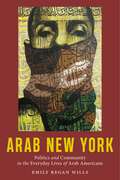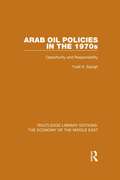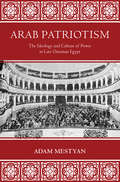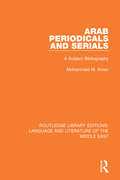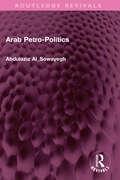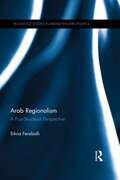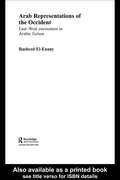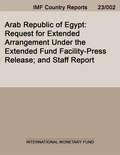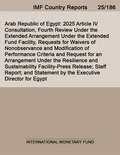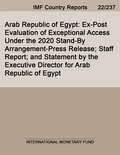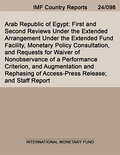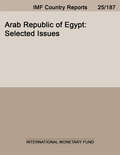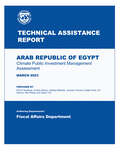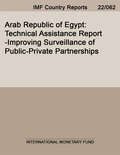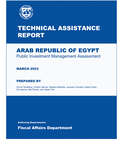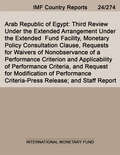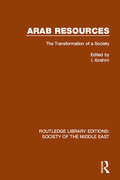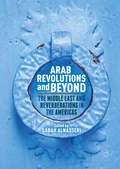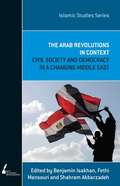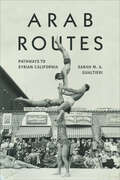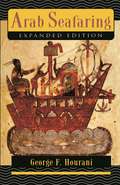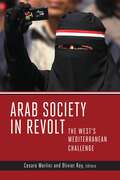- Table View
- List View
Arab New York: Politics and Community in the Everyday Lives of Arab Americans
by Emily Regan WillsFrom Bay Ridge to Astoria, explore political action in Arab New York Arab Americans are a numerically small proportion of the US population yet have been the target of a disproportionate amount of political scrutiny. Most non-Arab Americans know little about what life is actually like within Arab communities and in organizations run by and for the Arab community. Big political questions are central to the Arab American experience—how are politics integrated into Arab Americans’ everyday lives? In Arab New York, Emily Regan Wills looks outside the traditional ideas of political engagement to see the importance of politics in Arab American communities in New York. Regan Wills focuses on the spaces of public and communal life in the five boroughs of New York, which are home to the third largest concentration of people of Arab descent in the US. Many different ethnic and religious groups form the overarching Arab American identity, and their political engagement in the US is complex.Regan Wills examines the way that daily practice and speech form the foundation of political action and meaning. Drawing on interviews and participant observation with activist groups and community organizations, Regan Wills explores topics such as Arab American identity for children, relationships with Arab and non-Arab Americans, young women as leaders in the Muslim and Arab American community, support and activism for Palestine, and revolutionary change in Egypt and Yemen. Ultimately, she claims that in order to understand Arab American political engagement and see how political action develops in Arab American contexts, one must understand Arab Americans in their own terms of political and public engagement. They are, Regan Wills argues, profoundly engaged with everyday politics and political questions that don’t match up to conventional politics. Arab New York draws from rich ethnographic data and presents a narrative, compelling picture of a community engaging with politics on its own terms. Written to expand the existing literature on Arab Americans to include more direct engagement with politics and discourse, Arab New York also serves as an appropriate introduction to Arab American communities, ethnic dynamics in New York City and elsewhere in urban America, and the concept of everyday politics.
Arab Oil Policies in the 1970s: Opportunity and Responsibility (Routledge Library Editions: The Economy of the Middle East)
by Yusuf A. SayighUntil 1973 few people, either in the advanced, industrial countries or in the developing countries of the Third World, thought seriously on the issues and complexities involved in the production and marketing of the oil on which they relied. It was only with the sudden steep increases in oil prices that the oil industry became a matter of general discussion, and the Organisation of Petroleum Exporting Countries (OPEC) became a front page topic for analysis and comment. However, real understanding of the organisation and its policies did not accompany this rush of interest and much confusion has followed. In particular, the Arab exporters have received the weight of the criticism although they have only a share in the market and not a monopoly. This book attempts to instil a greater mutual understanding between oil exporters and importers, although it is not a wholesale endorsement of Arab policies, by outlining the major policy areas in this field. It looks at new policy options and their implications in exploration, marketing and pricing and at downstream operations such as the petrochemical and gas industries. In conclusion, this study identifies the wide-ranging opportunities that the new oil policies have opened up for the Arab countries, in the national, regional and international context, and assesses and clarifies the responsibilities which accompany this success. First published in 1983.
Arab Patriotism: The Ideology and Culture of Power in Late Ottoman Egypt
by Adam MestyanArab Patriotism presents the essential backstory to the formation of the modern nation-state and mass nationalism in the Middle East. While standard histories claim that the roots of Arab nationalism emerged in opposition to the Ottoman milieu, Adam Mestyan points to the patriotic sentiment that grew in the Egyptian province of the Ottoman Empire during the nineteenth century, arguing that it served as a pivotal way station on the path to the birth of Arab nationhood. Through extensive archival research, Mestyan examines the collusion of various Ottoman elites in creating this nascent sense of national belonging and finds that learned culture played a central role in this development. Mestyan investigates the experience of community during this period, engendered through participation in public rituals and being part of a theater audience. He describes the embodied and textual ways these experiences were produced through urban spaces, poetry, performances, and journals. From the Khedivial Opera House's staging of Verdi's Aida and the first Arabic magazine to the ‘Urabi revolution and the restoration of the authority of Ottoman viceroys under British occupation, Mestyan illuminates the cultural dynamics of a regime that served as the precondition for nation-building in the Middle East. A wholly original exploration of Egypt in the context of the Ottoman Empire, Arab Patriotism sheds fresh light on the evolving sense of political belonging in the Arab world.
Arab Periodicals and Serials: A Subject Bibliography (Routledge Library Editions: Language & Literature of the Middle East)
by Mohammad M. AmanThis bibliography, first published in 1979, is a guide to serials and periodicals in Arabic, English, French and other European languages published in the Arab countries or in the Western hemisphere. Arab serials and periodicals are considered primary sources of information on subject matters related to the Arab world. Lack of comprehensive bibliographies of Arab serials in the English language has hindered the work of librarians and Middle East specialists who need to identify a large number of such publications published in and about the Arab world. This bibliography is a research tool designed specifically to fill that gap.
Arab Petro-Politics (Routledge Revivals)
by Abdulaziz Al_SowayeghFirst Published in 1984, Arab Petro-Politics argues that oil is important to Arab world both as an instrument for economic development and as an element of political influence. Oil has changed the political and economic structures and policies in the Middle East and dramatically influenced political alignments both within the region and between the region and the world’s greatest powers. The book seeks to explain Arab oil policy both in economic terms and as political leverage to support Arab demands. Its main thesis is that the oil crisis is inextricably part of the Arab Israeli conflict despite the tendency amongst Western Middle East specialists to separate oil question from the Palestinian issue. This book is an important historical document for scholars and researchers of international oil economics, Middle East politics, and Middle East history.
Arab Regionalism: A Post-Structural Perspective (Routledge Studies in Middle Eastern Politics)
by Silvia FerabolliArab regionalism details and examines the power relations involved in the making of an Arab region. On an empirical level, this book concentrates on the drawing of topographic and ideational boundaries in the Arab region, on Arab regional organizations, on the functional cooperation among Arab states and institutions, and on the socio-cultural infra-structure that supports the Arab region making process, with a strong focus on post-1990 dynamics. On a theoretical level, this work makes a case for the analytical autonomy of "Arab" regionalism (as opposed to regionalism in the Middle East or in the Mediterranean) and for the necessity of approaching it as an actual process instead of a failed project. The attitude of debasement and erasure towards Arab regionalism that is common-place in the field of regional studies is replaced in this book for the acknowledgment that there is much more political coordination, economic cooperation and social integration in the Arab region than has previously been assumed. Providing a fresh perspective on Arab regionalism, this book will be an essential resource for scholars and researchers with an interest in Regionalism, Middle Eastern Politics and International Relations.
Arab Representations of the Occident: East-West Encounters in Arabic Fiction (Culture and Civilization in the Middle East)
by Rasheed El-EnanyThis is one of the first books in English to explore Arab responses to Western culture and values in modern Arab literature. Through in-depth research El-Enany examines the attitudes as expressed mainly through works of fiction written by Arab authors during the twentieth, and, to a lesser extent, nineteenth century. It constitutes an original addition to the age-old East-West debate, and is particularly relevant to the current discussion on Islam and the West. Alongside raising highly topical questions about stereotypical ideas concerning Arabs and Muslims in general, the book explores representations of the West by the foremost Arab intellectuals over a two-century period, up to the present day, and will appeal to those with an interest in Islam, the Middle East, nationalism and the so-called ‘Clash of Civilizations’.
Arab Republic of Egypt: 2005 Article IV Consultation--Staff Report; Public Information Notice on the Executive Board Discussion; and Statement by the Executive Director for the Arab Republic of Egypt
by Carlo Cottarelli Lorenzo PérezA report from the International Monetary Fund.
Arab Republic of Egypt: 2007 Article IV Consultation--Staff Report; Staff Statement; Public Information Notice on the Executive Board Discussion; and Statement by the Executive Director for the Arab Republic of Egypt
by International Monetary FundA report from the International Monetary Fund.
Arab Republic of Egypt: 2017 Article Iv Consultation, Second Review Under The Extended Arrangement Under The Extended Fund Facility, And Request For Modification Of Performance Criteria-press Release; Staff Report; And Statement By The Executive Director For The Arab Republic Of Egypt (Imf Staff Country Reports)
by International Monetary Fund. Middle East and Central Asia Dept.A report from the International Monetary Fund.
Arab Republic of Egypt: 2025 Article IV Consultation, Fourth Review Under the Extended Arrangement Under the Extended Fund Facility, Requests for Waivers of Nonobservance and Modification of Performance Criteria and Request for an Arrangement Under the Resilience and Sustainability Facility-Press Release; Staff Report; and Statement by the Executive Director for Egypt
by International Monetary Fund. Middle East and Central Asia Dept.A report from the International Monetary Fund.
Arab Republic of Egypt: Ex-Post Evaluation of Exceptional Access Under the 2020 Stand-By Arrangement-Press Release; Staff Report; and Statement by the Executive Director for Arab Republic of Egypt
by International Monetary Fund. Middle East and Central Asia Dept.A report from the International Monetary Fund.
Arab Republic of Egypt: First And Second Reviews Under The Extended Arrangement Under The Extended Fund Facility, Monetary Policy Consultation, And Requests For Waiver Of Nonobservance Of A Performance Criterion, And Augmentation And Rephasing Of Access-press Release; And Staff Report (Imf Staff Country Reports)
by International Monetary Fund. Middle East and Central Asia Dept.A report from the International Monetary Fund.
Arab Republic of Egypt: Selected Issues
by International Monetary Fund. Middle East and Central Asia Dept.A report from the International Monetary Fund.
Arab Republic of Egypt: Technical Assistance Report-Climate Public Investment Management Assessment
by International Monetary Fund. Fiscal Affairs Dept.A report from the International Monetary Fund.
Arab Republic of Egypt: Technical Assistance Report-Improving Surveillance of Public-Private Partnerships (Imf Staff Country Reports)
by International Monetary Fund. Fiscal Affairs Dept.A report from the International Monetary Fund.
Arab Republic of Egypt: Technical Assistance Report-Public Investment Management Assessment
by International Monetary Fund. Fiscal Affairs Dept.A report from the International Monetary Fund.
Arab Republic of Egypt: Third Review Under The Extended Arrangement Under The Extended Fund Facility, Monetary Policy Consultation Clause, Requests For Waivers Of Nonobservance Of A Performance Criterion And Applicability Of Performance Criteria, And Request For Modification Of Performance Criteria-press Release; And Staff Report (Imf Staff Country Reports)
by International Monetary Fund. Middle East and Central Asia Dept.A report from the International Monetary Fund.
Arab Resources: The Transformation of a Society (Routledge Library Editions: Society of the Middle East #3)
by I. IbrahimThe modern Arab world is faced with a serious problem in the imbalance between human and natural resources. The Gulf states, with their vast natural resources, are poor in human resources, whereas in Egypt or Jordan the picture is reversed. This study, first published in 1983, considers the range of factors affecting development in the Arab world and examines the broad sectoral resources, the infrastructure for resource development and the range of problems shaping the political economy of Arab advancement. In conclusion, an analysis is made of the existing trends in the transformation of Arab society and ways are suggested in which these trends will develop over the next decade.
Arab Revolutions and Beyond: The Middle East and Reverberations in the Americas
by Sabah AlnasseriThis edited volume brings together global perspectives on twenty-first century Arab revolutions to theoretically and methodologically link these contemporary uprisings to resistance and protest movements worldwide, above all in the Americas. In their analyses of these transformations, the international contributors engage in an exploration of a variety of themes such as social movements and cultures of resistance, geopolitical economics, civic virtue, identity building, human rights, and foreign economic and political influence. What is the historical significance of these revolutions? What are the implications beyond the Middle East? And how are struggles in other regions of the world being influenced by these events? These heretofore largely unanswered questions are addressed in this collection, developed from presentations at a 2013 international conference on the "Arab Revolutions and Beyond" at York University, Toronto, Canada.
Arab Revolutions in Context: Civil Society and Democracy in a Changing Middle East (Islamic Studies Series)
by Fethi Mansouri Shahram Akbarzadeh Benjamin IsakhanFrom late 2010 a series of dramatic and unprecedented events swept across the Middle East and North Africa, toppling several autocratic regimes that had held power for decades and ushering in a new climate of dissent and democratisation. The Arab Revolutions in Context seizes a unique opportunity to reflect on these seismic events, their causes and consequences, and the core issues facing the region as it moves forward. This volume is more than a collection of detailed thematic essays.It situates the Arab Revolutions within their broader contextual backgrounds—showing that a unique set of historical events, as well as local, regional and global dynamics, has converged to provide the catalyst that triggered the recent revolts-and also within a new conceptual framework. The argument here is that the Arab Revolutions pose a very specific challenge to conventional wisdom concerning democracy and democratisation in the Middle East. The Arab Revolutions in Context is the first volume of its kind to address the Arab Revolutions and the varying analyses, debates and discussions that they have stimulated. Islamic Studies Series - Volume 12
Arab Routes: Pathways to Syrian California (Stanford Studies in Comparative Race and Ethnicity)
by Sarah GualtieriLos Angeles is home to the largest population of people of Middle Eastern origin and descent in the United States. Since the late nineteenth century, Syrian and Lebanese migration, in particular, to Southern California has been intimately connected to and through Latin America. Arab Routes uncovers the stories of this Syrian American community, one both Arabized and Latinized, to reveal important cross-border and multiethnic solidarities in Syrian California. Sarah M. A. Gualtieri reconstructs the early Syrian connections through California, Texas, Mexico, and Lebanon. She reveals the Syrian interests in the defense of the Mexican American teens charged in the 1942 Sleepy Lagoon murder, in actor Danny Thomas's rise to prominence in LA's Syrian cultural festivals, and in more recent activities of the grandchildren of immigrants to reclaim a sense of Arabness. Gualtieri reinscribes Syrians into Southern California history through her examination of powerful images and texts, augmented with interviews with descendants of immigrants. Telling the story of how Syrians helped forge a global Los Angeles, Arab Routes counters a long-held stereotype of Arabs as outsiders and underscores their longstanding place in American culture and in interethnic coalitions, past and present.
Arab Seafaring: In the Indian Ocean in Ancient and Early Medieval Times - Expanded Edition
by George F. HouraniIn this classic work George Hourani deals with the history of the sea trade of the Arabs in the Indian Ocean from its obscure origins many centuries before Christ to the time of its full extension to China and East Africa in the ninth and tenth centuries. The book comprises a brief but masterly historical account that has never been superseded. The author gives attention not only to geography, meteorology, and the details of travel, but also to the ships themselves, including a discussion of the origin of stitched planking and of the lateen fore-and-aft sails. Piracy in the Indian Ocean, day-to-day life at sea, the establishment of ancient lighthouses and the production of early maritime guides, handbooks, and port directories are all described in fascinating detail. Arab Seafaring will appeal to anyone interested in Arab life or the history of navigation. For this expanded edition, John Carswell has added a new introduction, a bibliography, and notes that add material from recent archaeological research.
Arab Society in Revolt
by Olivier Roy Cesare MerliniFor every pithy conceptualization of complex events, there are additional lenses through which to examine them. One of the several virtues of this book is precisely that it brings different perspectives to bear on the complexity, diversity, and uncertainty of recent and current events in the Arab world. The thirteen authors concentrate on the critical social forces shaping the region--demography, religion, gender, telecommunication connectivity, and economic structures--and they are painstakingly analyzed and evaluated.--from the foreword by Strobe Talbott, president of the Brookings InstitutionThe Arab Spring will be remembered as a period of great change for the Arab states of North Africa and the eastern Mediterranean. Facing fundamental transitions in governance, these countries are also undergoing profound social, cultural, and religious changes. The European Union and the United States, caught unprepared by the uprisings, now must address the inescapable challenges of those changes. How will the West respond to these new realities, particularly in light of international economic uncertainty, EU ambivalence toward a "cohesive foreign policy," and declining U.S. influence abroad? Arab Society in Revolt explains and interprets the societal transformations occurring in the Arab Muslim world, their ramifications for the West, and possible policy options for dealing with this new world. Arab Society in Revolt examines areas of change particularly relevant in the southern Mediterranean: demography and migration, Islamic revival and democracy, rapidly changing roles of women in Arab society, the Internet in Arab societies, commercial and social entrepreneurship as change factors, and the economics of Arab transitions. The book then looks at those cultural and religious as well as political and economic factors that have influenced the Western response, or lack of it, to the Arab Spring as well as the policy options that remain open.
Arab Society in Revolt
by Olivier Roy Cesare MerliniFor every pithy conceptualization of complex events, there are additional lenses through which to examine them. One of the several virtues of this book is precisely that it brings different perspectives to bear on the complexity, diversity, and uncertainty of recent and current events in the Arab world. The thirteen authors concentrate on the critical social forces shaping the region-demography, religion, gender, telecommunication connectivity, and economic structures-and they are painstakingly analyzed and evaluated.-from the foreword by Strobe Talbott, president of the Brookings InstitutionThe Arab Spring will be remembered as a period of great change for the Arab states of North Africa and the eastern Mediterranean. Facing fundamental transitions in governance, these countries are also undergoing profound social, cultural, and religious changes. The European Union and the United States, caught unprepared by the uprisings, now must address the inescapable challenges of those changes. How will the West respond to these new realities, particularly in light of international economic uncertainty, EU ambivalence toward a "cohesive foreign policy," and declining U.S. influence abroad? Arab Society in Revolt explains and interprets the societal transformations occurring in the Arab Muslim world, their ramifications for the West, and possible policy options for dealing with this new world. Arab Society in Revolt examines areas of change particularly relevant in the southern Mediterranean: demography and migration, Islamic revival and democracy, rapidly changing roles of women in Arab society, the Internet in Arab societies, commercial and social entrepreneurship as change factors, and the economics of Arab transitions. The book then looks at those cultural and religious as well as political and economic factors that have influenced the Western response, or lack of it, to the Arab Spring as well as the policy options that remain open.
